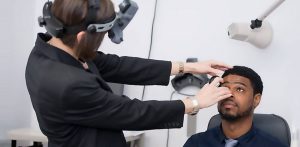Head injuries can increase an athlete’s risk of life-long complications.
Concussions and other types of brain injuries that result from a sudden jolt or blow to the head can cause headaches, imbalance, concentration difficulties, and even anger management problems.
According to National Academies Press (2014), sustaining as little as two concussions in one’s lifetime can lead to serious and life-long complications.
Unfortunately, contact sports are infamous for head injuries— but the health repercussions of multiple impacts can be life-altering and cause any of the following life-long conditions:
1. Chronic traumatic encephalopathy (CTE)
Chronic traumatic encephalopathy is a degenerative brain disease caused by repeated brain traumas. This condition occurs when specific proteins in the brain, called tau proteins, develop clumps. These clumps disperse throughout the brain and lead to permanent brain cell damage.
Chronic traumatic encephalopathy has been shown to cause progressive memory and cognition loss, poor impulse control, aggression, depression, suicidal behavior, Dementia and Parkinson’s.
Neurosurgery (August, 2013) published two different case reports involving two National Football League (NFL) players that had been playing football since high school. The reports stated that these players are now suffering from a variety of neuropsychological diseases, following multiple head injuries.
According to Clinics in Sports Medicine (2011), CTE is caused by multiple head injuries over a period of years— even if the injury did not result in a clinical concussion.
2. Depression
Clinical depression is a mental disorder that impacts your thoughts, emotions and behaviors.
Depression can significantly impact academic success and work performance, and seriously affect familial relationships and social interactions. Changes in appetite, sleep disruptions, loss of interest in previously loved activities and thoughts of suicide are all possible symptoms.
According to Medicine and Science in Sports and Exercise (2007) there is a clear correlation between head injuries and long-term depression.
Retired athletes who had three or more concussions were three times more likely to experience depression, when compared to those who had never had a concussion. Athletes who had one or two concussions were 1.5 times more likely to experience depression.
If you, or a loved one, has suffered a head injury see a neuro-optometrist for a complete examination of your visual system.
SEE RELATED: Eye Movement Problems After a Brain Injury
3. Dementia pugilistica
Dementia pugilistica, sometimes referred to as ‘punch-drunk’ is a neurological disease caused by multiple concussions.
The term ‘pugil’ is a Latin word that means ‘boxer’ or ‘fighter’, and has helped coined the clinical term for this condition, as it was initially diagnosed in boxers in the 1920s.
Dementia pugilistica is known for causing memory loss, disorientation, speech difficulties, tremors and sluggish movements.
Dementia pugilistica is a form of CTE that contains some overlapping characteristics with Alzheimer’s disease.
4. Neurocognitive impairments
The signs and symptoms of a concussion often affect a person’s cognitive abilities, resulting in concentration difficulties, irritability, disorientation, and loss of balance.
Multiple brain injuries increase the risk of long-term impaired cognitive functioning.
According to National Academies Press (2014), studies show that football and hockey players that sustained multiple head injuries also suffered from impaired cognitive functioning.
In one study, it was reported that the affected athletes sustained neurocognitive impairments in both working and visual memory.
Another study reported that the affected athletes suffered from lack of impulse control and imbalance.
5. Slower neurological recovery
Millions of head injuries are reported each year, but the risks of prolonged recovery after multiple concussions have yet to be uncovered.
It is crucial to refrain from engaging in any contact sports or other activities that pose a risk of head injury until full recovery is reached.
The National Academies Press (2014) published a study that reported a correlation between a longer recovery period and a history of multiple concussions. According to the study, multiple concussions can lead to lifelong neurocognitive impairment.
How can neuro-optometry help?
Neuro-optometry is a branch of optometry with a focus on strengthening the visual system post-brain injury or other neurological disorder.
Neuro-optometric rehabilitation is a therapy used to improve the visual and oculomotor skills in order to increase independent functioning and improve quality of life following a traumatic brain injury.
Neuro-optometrists are aware of the challenges that accompany multiple head injuries and will evaluate the entire visual system, including functional binocularity, spatial vision, and visual processing abilities, to determine if a vision problem exists.
If a functional vision problem exists, a comprehensive management program will be recommended in order to strengthen the visual system and alleviate symptoms caused by a neurological disorder.
If you, or a loved one, has suffered a head injury see a neuro-optometrist for a complete examination of your visual system.
LEARN MORE: Neuro-Optometry
Unfortunately, contact sports are often the cause of many head injuries, and the health repercussions of these impacts can be severe and life-long.
Fortunately, neuro-optometrists can diagnose and treat the visual effects of these head injuries.










